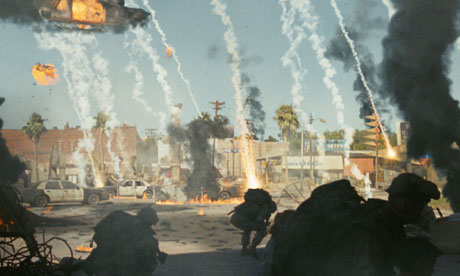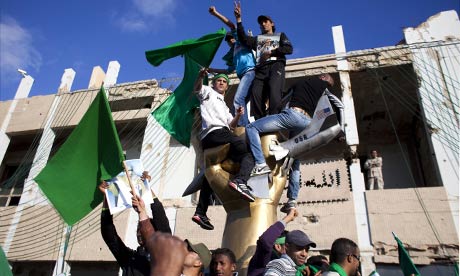Thursday, 24 March 2011
Directed by Jonathan Liebesman
Written by Christopher Bertolini
Starring Aaron Eckhart, Michelle Rodriguez
Release date(s) Out Now
Running time 116 minutes
And so we have the first big flop of 2011. Battle: Los Angeles is an old school alien invasion movie that endeavours to blend the classic war movie and science fiction genres, but only manages to capture the worst elements of both.
Battle: Los Angeles was billed as an amalgamation of 2009's poignant District 9 with the cheesy jingoism of a Top Gun, but suffers from amateurish production and a script of pure cracker barrel chedder that would make Roland Emmerich blush.
When District 9 arrived in cinemas to critical acclaim many predicted that it would become something of a trend setter, spawning a new wave of intelligent sci-fi with a style of gritty realism. Those predictions appear to have been well founded, but I doubt anyone could have foreseen the precession of cynical imitators that have come and gone, each one convinced that sticking a shaky camera on any old drivel is enough to turn a film into a deep, thought-provoking masterpiece.
Well this film may be the worst culprit of this most obnoxious of conceit that I have yet encountered. Shaky cam is absolutely fine when it's in context and justified, but here it arbitrarily dominates every single scene: walking down the road? Shaky cam. Two marines playing golf? Shaky cam. Buying flowers at the supermarket? Oh you better believe there's shaky cam.
What's worse is that the technique isn't even well implemented, with the camera jumping about unnaturally like someone's having a seizure. Actually it rather makes me want to watch the behind the scenes footage just so I can see the cameraman wobbling all over the place like a jackass.
The effect in itself would already be fairly nauseating, but the death-metal music-video style of direction only compounds the problem. Every scene is is a mish mash of incoherently cut, split-second shots, shaking and awkwardly zooming (if you want a comparison, think Alien vs Predator 2). It makes for unpleasant, and frankly difficult watching. The intention was clearly to give the film a kinetic, action packed feel, it's just a shame they made such an uneven mess out of it.
Where the film stood an honest chance of redeeming itself was character. The focus is wisely placed on the marines rather than the conflict or the aliens, an idea that could have lent itself to some high quality Hurt Locker-esque war-time drama or even a commentary on real life events. As it happens, their time is mostly spent shouting hackneyed one liners back at each other and pulling their most "intense" face for the cameras. In fact after the opening twenty minutes I'm pretty sure there is only about a dozen or so lines of dialogue for the remainder of the film. Instead the "narrative" just ambles awkwardly from one incoherently shot action set piece to the next with little or no logical thread running between them.
The characters themselves are not badly acted. Aaron Eckhart is a decent enough actor, and I can honestly say that Michelle Rodriguez performs the standard "Michelle Rodriguez" role better than any other actor. The trouble is that there is nothing here for them to work with. The opening exposition segment of the film hints at some potential for development or interpersonal relationships, and then the script promptly seems to forget all about it when the action starts. Rodriguez in particular gets surprisingly little screen time... I think... With the way the film is shot it's often pretty hard to tell who exactly is on screen at any one time.
It seems odd for me to try and critique the narrative or setting after I've already mentioned that there isn't much of one in this film, but anyway. The title says "Battle: Los Angeles" and yet the chosen locale is sadly squandered, with very little sense of place. They could switch Los Angeles with any other city in the world and I don't think a single frame in the movie would have to be changed.
As for the aliens themselves, it doesn't bother me so much that nothing is ever explained about them. What is a problem, however, is just how faceless and unremarkable they are. There is none of the awe or menace that one gets from a film like Independence Day, and as a result it's hard to get caught up in the struggle or really care when the aliens eventually lose. There is one scene in particular where they capture and torture an alien until they find out how to kill him (surprisingly stabbing him a few dozen times seems to do the trick), and if anything I end up feeling more sorry for the alien. On the plus side at least he got to leave the film before I did.
At the very least one would expect that this genre could yield way to some entertainingly cheesy US Army (oo-rah) bravura that typically turns an otherwise bad movie into a decent popcorn stuffer. But they couldn't even get that right. The dialogue here tragically lands on the wrong side of too much and makes the likes of 2012 and Top Gun look like Dostoyevsky, cramming as many clichés as possible into each exchange. Some scenes honestly look like a Seth Macfarlane parody.
It could have been a good film, it could have at least been a fun film. It's neither.
"Loves":
Decent special effects
Opening sequence sets the scenes for some mindless fun
Hates:
That "fun" never materialises
Messy production
Poor script
Tuesday, 22 March 2011
It was a weekend of sensationalist headlines and propaganda as operation Odyssey Dawn got underway in Libya. The push for a no-fly zone had been spearheaded by Great Britain and France for weeks, but it was only once a successful UN vote eased the United States off the fence that the idea finally found some traction. No doubt over the coming days and weeks a common theme will be the question of whether this conflict is the new Iraq war, and particularly the ramifications that concept may hold for the Nobel Peace prize winning President Obama. But just how apt is this comparison?
First the similarities that early adopters have already begun to trumpet; both Iraq and Libya are run by cruel and brutal dictators and are in possession of great quantities of oil, both are muslim countries. However this is pretty much as far as it goes, and as you can see, so far so superficial.
The obvious concern is that the coalition of Western powers may be walking into yet another quagmire, one that will create massive deficits, cost lives, and further strain relations between them and the Muslim world. This is particularly an issue of concern for Obama who has made reaching out to these formally unfavourable nations a cornerstone of his foreign policy with marked success, one might worry that this single act will jeopardise all that progress.
But these comparisons are, as I said, superficial at best, and the worries are premature. There is a great deal of difference between this conflict and the Iraq war that plunged a decade of American foreign policy into ruin.
First and foremost there is the fact that technically speaking this is not even a war yet. There are no ground troops committed, and no offensive action permitted against Gaddafi. Right now the only aims of the operation are to defend the Libyan civilians by disabling Gaddafi's attack forces. Far from Iraq's full scale invasion, this operation merely oversees aerial support. In this regard the conflict has a good deal more in common with Bill Clinton's cautious brand of foreign policy from the 1990s, which saw him launch similar bombardments on Iraq, Yugoslavia, Sudan and others, while remaining hesitant to commit America to long term conflicts. Few people would compare those events with what we saw under the Bush administration, as they seem so quick to do with this most recent conflict.
Further more, the situation in the region could not be more different than that which was seen in Iraq eight years ago. Libya right now is in a state of open civil war, with thousands dead, and conflict raging. The situation has become so dire that the Libyan people have actually requested intervention from the west. As Gaddafi continues to move into Benghazi and beyond, there is the very real risk that thousands, if not hundreds of thousands, of Libyan civilians could be killed. This threat, simply put, did not exist with Iraq. That nation was relatively stable, and there was no clear reason to go to war, as evidenced by the Bush administration's constant jumping jacks between different excuses (WMDs? Terrorists? Humanitarian crisis? Oil? Pick your flavour of the week).
Perhaps most important is the difference in implementation between conflicts. The proper channels have been pursued in approving this operation cleanly and legally through the United Nations, something which was deemed to be an unnecessary waste of time for the Iraq War. As a result, the conflict is progressing multilaterally with the support of the UN, the international community, and most crucially the Arab nations in the region. Contrast this with Bush's illegally waged, unilateral war where he struggled to scrounge together any form of coalition to support him and went into Iraq against the will of the muslim world. From day one it was a catastrophe and one which destabilised international relations, particularly western/Arab relations, for a decade. Indeed, this time the United States even seems to be marginalising its role in the conflict, allowing Great Britain and France to take charge.
This radically different approach makes all the difference. The support of muslim nations will make it harder for Gaddafi's propaganda machine to demonise the Western interlopers, and the multinational support will bear the brunt and culpability of the conflict together, rather than making this "America's war" as was the case with Iraq. Add to this the lack of committed ground forces, and it is clear that this is a very different kind of conflict to Iraq, and one which carries far less risk.
The perception of the Iraq war was that the Bush administration fully and unilaterally invaded the muslim world, with scant multinational support, no legal justification, and a shaky moral standing. By contrast operation Odyssey Dawn is legal, backed by the international community, and only features aerial support missions. The former set international relations back several decades, the latter seems to be appropriately working within them. I suspect that it has been so long since we've seen a US President pursuing rational foreign policy that the gut reaction may be to compare this conflict to Bush's wars, but in reality the operation has far more in common with Clintonian foreign policy. We would all do well to maintain some perspective.
Tuesday, 15 March 2011
Genre Alternative
Label Self-released
Producer Nigel Godrich
Release Date 28th March (iTunes and stores), Out Now (Radiohead website)
Thom Yorke and his cohorts have returned with their long awaited follow up to 2007's critically acclaimed In Rainbows, but anyone expecting more of the same will go away bitterly disappointed.
More Kid A than Ok Computer, this latest offering takes a very deliberate step away from some of the band's more radio friendly releases, and taps into the Radiohead propensity for dark and broody experimentation. As a result, fan reaction has been somewhat mixed; praised by some as their finest work to date, dismissed by others as impenetrable and self indulgent.
The final product is work of a much lower tone and intensity, free of the kind of balladry that typifies their biggest hits. But low-key though it is, there is nuance here to be appreciated if one attempts to do so. This is certainly an album that requires multiple listens before an informed opinion can be reached. Fortunately, repeated listening is an easy challenge, as running just barely half an hour long this is also Radiohead's shortest album to date.
While the quality varies, the standout track has to be Codex, a hauntingly beautiful and atmospheric piece that will linger long in the memory. Elsewhere Little by little sees Yorke at his most angsty, while Give up the Ghost is a lush acoustic sonnet. Beyond these songs however, it is hard to find much else of note, the pitfalls of releasing such a small LP.
Whichever way you choose to look at this album, Radiohead at their worst are rarely anything other than interesting. The issue I have is that the King of Limbs never achieves or even seems to reach for the level of greatness that we have come to expect from the band. Especially when you consider the four year gap between albums, one can't help but be a little disappointed that we only have 8 tracks here, perfectly decent songs, of which few are particularly memorable.
Must Listen
Codex
Give up the Ghost
Little by Little
Friday, 11 March 2011
Directed by Danny Boyle
Written by Nick Dear, Mary Shelley (novel)
Starring Benedict Cumberbatch, Jonny Lee Miller
Theatre National Theatre
Needless to say, I was excited when I first heard that Danny Boyle, who has cemented a reputation as one of the best film makers of his generation, was returning to his roots in the theatre. At the same time this is a director whose films often shine through their clever use of technology and editing, techniques which are not available on the stage. I was looking forward to seeing how Boyle would cope with a much more traditional medium.
Joining Boyle is previous collaborator Jonny Lee Miller, as well as up and coming star Benedict Cumberbatch. The two stars alternate roles every night between Dr. Frankenstein and his creation, the Creature, with the former thespian bringing to life the more emotional and animalistic side of the two characters while Cumberbatch revels in the colder, intellectual aspects. Both are superb.
However, this is not Shelley's Frankenstein. Here the focus is much more on the Creature, and less on Frankenstein himself as most dramatisations of the literature tend to be. Thematically then there is a shift from a tale of hubris and callousness to one of sorrow and tragic irony. The focus is much more on the duality of the two central characters, as underlined by the nightly role reversal between the two actors.
My first impressions upon entering the theatre were positive. The set design was intricate and creative, and reached out into the audience with surfaces coated in a skin-like bandage, and a bell in the centre of the room from which a heavy rope hung down into the aisle to be pulled by audience members.
The production itself starts with panache, as Mary Shelley's classic creature bursts forth out of artificial womb stark naked, writhing in agony for several minutes as he learns to stand and walk. Boyle-esque flourishes fill the excellent first half of the evening, lending the proceedings a helping of the director's unmistakably unique brand of magic. Especially notable is a complex array of ceiling lights which fizzes to life in order to emphasise the action on stage, and the impressive mechanical representation of a train which spews steam and noise to startling effect.
The stylistic peak is reached in an early scene where the Creature explores the world around him for the first time, birds shoot out of tree trunks as the sunrise arcs across the back of the stage; the lighting and staging is absolutely divine. In addition, each scene is sublimely complemented by the fine musical work of electronic band underworld.
But this really is a play of two distinct halves. The first is simply a spectacular sensory feast for the audience, focusing entirely on the Creature as he finds his feet in the world. Later on when the focus shifts over to Dr. Frankenstein, the script starts to plod, and the innovative staging suddenly takes a turn for the more conventional. Indeed perhaps there is a narrative justification for this, as the more uplifting first half is about learning and enlightenment of a naive and innocent Creature who gradually sees the darkness in the world, while the frostier second half switches to a jaded and distant Dr. Frankenstein. For those in the audience who find themselves as blown away by the opening as I was, the later change in pace may come as a let down.
Despite this, I was not disappointed by my night out, and frankly the entire event is so finely produced, staged and acted (by the two stars anyway- the supporting cast is actually a bit weak) that I can't see how anyone will be. Danny Boyle's latest piece of brilliance is one of the best theatrical productions I've seen in a long time, and possibly the best you will see all year.



